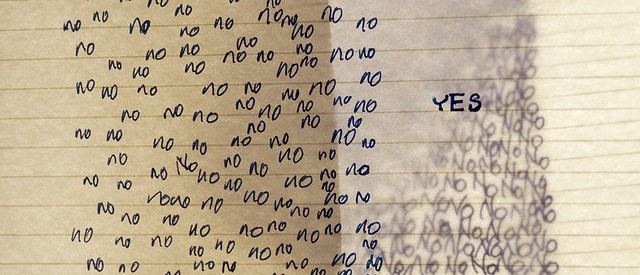Saying No Is Terrifying But It Might Help Your Career

As I mentioned earlier today, one of the themes that kept coming up at NerdCon: Stories was that saying no can help your career.
Before you think this is going to be some Medium-esque inspiration post about the joys of learning to say no, I will add that every panelist who mentioned it said saying no was incredibly difficult. Many of them still said yes when they wanted to say no, or had to will themselves to get the courage to say no, because saying no was that hard — and we’re talking people with bestselling novels and film deals here.
What’s holding them back from saying no? The same thing that’s holding us back. Money.
IF you say yes, THEN you earn money.
IF you say yes, THEN you meet people who might give you money later on.
IF you say yes, THEN you develop a reputation for being “easy to work with” or “always available,” which might lead to more opportunities and more money.
And so on.
If you say no, then you won’t earn that money they’re offering, plus you might not put yourself in the position to get the next gig. This is something that even bestselling authors worry about; that every book will be their last, that every gig will be their last, that you have to plan a career that will last a lifetime, and part of that planning means saying yes to everything because you never know when it will all go away.
(Raise your hand if you’ve ever felt like that. I felt like it when I worked at the think tank, and I feel like it now, and when I was a telemarketer I was terrified that my miserable job that I didn’t even want would go away, because that was where the money was coming from.)
At the money panel, Hank Green said that saying no or pushing back was important because it made you more valuable. If you say yes to everything, then people don’t have to consider your needs to get you on board. If you say no sometimes, people have to start thinking about what you might want before they make their offer.
At the “No Pressure: How to Keep Creating Once You’ve Technically Succeeded” panel, musician and writer Dessa Darling said that saying no helps you point your career in the direction you want it to go. This is important not only to a musician who has to decide what types of venues she wants to play and what kind of projects she wants to take on, but to anyone who’s ever put together a resume; you and I both know that the person who looks like they’re on a career path gets more attention than the person with a bunch of different jobs in different industries.
This is also incredibly hard, because you have to decide which path you want your career to take before you know whether there’s money at the end of that path. Darling spoke to the struggle of having to figure out, often with very limited resources, whether you’ll be able to find the opportunities you want, whether those opportunities will lead anywhere, and whether saying no to something now means closing yourself off to an opportunity that might have been better.
Patrick Rothfuss said he had trouble saying no because he wanted to win all the games. He wanted to win the writer game and the parent game and the charitable organization game and the convention guest game and so on. He compared life to a game of Settlers of Catan: you can’t get both Longest Road and Largest Army. You have to treat life like a resource management game, pick the winning scenario you want, and play as if you’re collecting resources for that scenario.
Rothfuss, by the way, recently wrote a blog post about how he said no to a lot of different The Name of the Wind movie deals until he got exactly what he wanted. He told us at NerdCon that he had to be ready to say no to the idea of having a movie made of his books — and, as Green suggested above, that meant the studios had to start considering what he wanted.
And at this point you’re probably thinking “well, that’s great if you’re a bestselling writer, but I can’t afford to say no to anything because I can’t afford to say no to anything.”
Yeah, me too. I have to keep reminding myself that every time I say no to something that I really don’t want, something that is closer to what I do want usually appears. So far that’s happened every single time, but that doesn’t mean it’ll continue to happen in the future.
I also say yes to a lot of “meh” opportunities because I like money and I want that reputation of being able to get things done — and because my current winning scenario is “pay off debt, get three-month emergency fund, put $5,500 in a Roth IRA.”
I know that if I said no to those opportunities, maybe better opportunities would show up. But saying no is hard, and I don’t trust that yet.
How about you?
Photo credit: Abhi
Support The Billfold
The Billfold continues to exist thanks to support from our readers. Help us continue to do our work by making a monthly pledge on Patreon or a one-time-only contribution through PayPal.
Comments